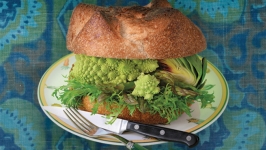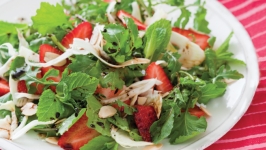Hidden Villa’s Farm-Based Maker Courses and Hands-on Experiences for Grownups
Deep in the heart of the residential hillside enclave of Los Altos Hills is a Silicon Valley green space called Hidden Villa—a haven for people of all ages who crave connecting with nature, and the cultivation of fresh, local food. Here, at the working farm, guests can learn about everything from sustainable gardening to olive brining. There are classes in fruit tree pruning, cheesemaking, bread baking and home canning. And this year, there’s a hands-on Farm-Based Cooking Academy to teach home cooks how to go from farm to fork. Visitors can enrich the spirit with an outdoor yoga session or a poetry stroll along Adobe Creek.
For many years, Hidden Villa’s farm programs focused mostly on children, helping them learn, for example, that milk does not originally come from cartons. But as orchard and range land have vanished in the region, program directors realized adults were also interested in exploring nature and learning more about food. In 2018, the Trust for Hidden Villa began an initiative called Food for Thought, to engage people of all ages in programs about gardening and farming, hiking and wellness, and food and cooking, among other new categories. In just one year, more than a thousand adults have joined in the fun.
“We are working to raise consciousness,” says Marc Sidel, senior director of programs at Hidden Villa. “We now live in a world where there is often a lack of connection to our environment and the source of the things we eat.”
Long ago this land was part of Mission Santa Clara’s vast cattle range. Later, it was a small piece of Rancho La Purísima Concepción, granted to Ohlone José Gorgonio by the Mexican government. He sold it in 1844 to Juana Briones, the beloved 19th-century Californio rancher and businesswoman. When Josephine and Frank Duveneck spotted the green valley off Moody Road in 1924, 1,000 acres were up for sale. The Duvenecks made Hidden Villa their home and the center of their humanitarian work for half a century and left the land in trust to the community they loved, with a focus on sustainability and education.
The farm has eight miles of hiking trails and 50 acres in agriculture. It nurtures chickens and bees as well as two cows, 15 sheep, 10 pigs and six goats. One playful popular program is The Scoop on Poop, designed mostly for kids but the grownups love it too. “We are very covetous of our poop here at the farm,” laughs Blair Thompson, animal husbandry manager at Hidden Villa. “We use it all right here, to great effect.”
Shortly before her death in 1978, founder Josephine Duveneck said she and her husband were leaving Hidden Villa in trust for a purpose. “Becoming aware of the relationships of all living things to other living things is the key to knowing ourselves,” she wrote. “It is the basis for understanding the intricate web of life.”
The means may change, but Hidden Villa’s legacy remains. With its new Food for Thought initiative, this remarkable farm and nature preserve continues to enrich all ages in the community with education and understanding, in an ever-changing valley.




